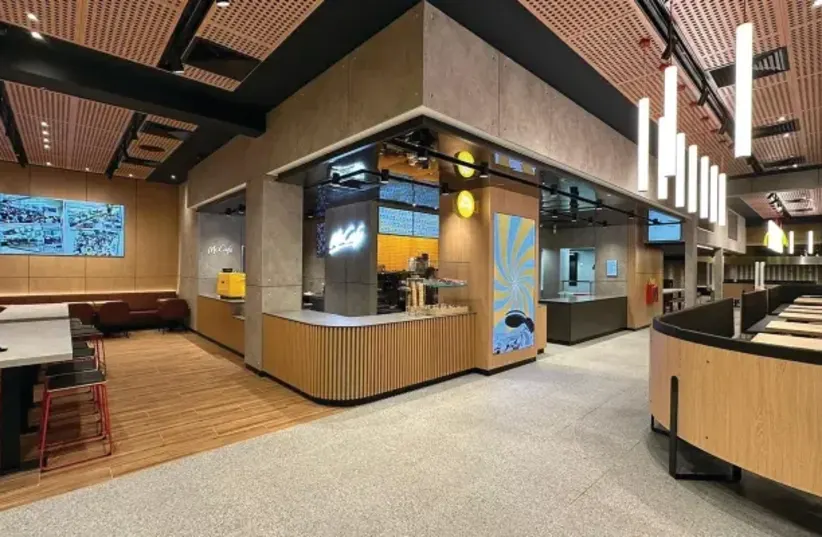The first McDonald's branch in the Middle East was opened in the Ayalon Mall, on October 14, 1993, as part of the entry of international corporations into Israel after the implementation of the Oslo Accords. Ministers, politicians and business leaders were present at its opening. This was the first branch of the well-known American brand, when thousands lined up at the branch doors and waited for hours in lines that stretched hundreds of meters. The restaurant was founded by the businessman Dr. Omri Padan, who owned the chain through the Aluniel company.
After 30 years, it was reported last week about the deal to sell the franchise back to the American corporation. The Israeli branch owns 225 restaurants with 5,000 employees. The amount of the transaction was not published, but estimates are that it exceeds NIS 2.5 billion. Some also estimate that it could reach much more. The activity generates a turnover of about NIS 2 billion and a profit of NIS 160-140 million.
The circumstances of the sale of the chain were not disclosed in the laconic announcement of the chain and the franchisee, when what was disclosed was: "Aloniel Ltd. is proud to operate McDonald's in Israel and serve its millions of customers. McDonald's Israel is the leading and most successful restaurant chain in Israel and for that we sincerely thank the management, employees, suppliers and customers who made this possible. We are confident in the company's future success. McDonald's remains committed to the Israeli market and to a positive experience for customers and employees."
I will try to review the meanings from visible sources only and connect the missing pieces of the puzzle. After the seventh of October, the McDonald's Israel chain went out with several significant social actions. One: increasing the fixed discount of 15% for soldiers in uniform to 50%, a significant benefit by all accounts. The second benefit included the distribution of rations to the soldiers as a gift, as part of the DNA of a patriotic Israeli society during a war, which unites around its heroes.
The third reference was the projection of abductees on giant screens inside the restaurants, with the words on the screen: "We do not forget and will not forget the abductees. We will continue to project their images on the screens, until they are released." At the bottom of the screen on the right side, there is the signature of the headquarters of families for the return of the abducted and missing persons and on the left side is the McDonald's logo.
This issue has become the target of a BDS campaign for supporting "genocide", meaning that McDonald's Israel's compliance with discounts for soldiers is equivalent to active support of the entire corporation for the purpose of "genocide" in Gaza. Franchisees of the McDonald's chain in other places in the Middle East, including Egypt, Lebanon and Turkey, were quick to deny any connection to the publications in Israel, issued statements stating that it did not concern them, and some even donated money to Gaza as a sign of solidarity with the Palestinians, but the gestures failed to calm the the winds.
10.המחאות נרחבות השפיעו על המכירות במזרח התיכון, אינדונזיה וצרפת.החרם על מקדונלד'ס נוצר לאחר שמדינות בעלות רוב מוסלמי כמו כווית, מלזיה ופקיסטן פרסמו הצהרות המרחקות את עצמן מהחברה.כאשר הקשתות המפורסמות הפכו קתות של ירי על ילדה בעזה, בקמפיין אפקטיבי שמתגלגל ברשתות החברתיות pic.twitter.com/Gf73k3eRgZ
— קובי ברדה-Kobby Barda (@kobbybarda) April 5, 2024
The idea was to boycott the American concern, especially in Muslim countries, in a course that became aimed at hitting the corporation "on the head". The widespread protests affected sales in the Middle East, Indonesia and France. The boycott of McDonald's came about after Muslim-majority countries such as Kuwait, Malaysia and Pakistan issued statements distancing themselves from the company. The famous bows became bows of shooting at a girl in Gaza, in an effective campaign that is unfolding on social networks.
11.החרם על מקדונלד'סהפגנות קוליות נערכו ברחבי העולם כשהחרם הבסיסי התפשט מעבר למזרח התיכון. בנוסף למסעדות באזור, כולל פגיעות פיזיות של מסעדות מקדונלדס, כאשר בוידיאו פה אנחנו רואים פגיעה בטורקיה (היו עוד כמובן, לשם ההמחשה). pic.twitter.com/lxO5QB4vm3
— קובי ברדה-Kobby Barda (@kobbybarda) April 5, 2024
Loud protests were held around the world as the grassroots boycott spread beyond the Middle East. The campaign included physical attacks at McDonald's restaurants, while in the video here we see an attack in Turkey (there were others, of course, for the sake of illustration). The protest "menu" also included a pro-Palestinian activist who released dozens of unfortunate mice in a branch of the McDonald's fast food chain in Birmingham, England, after painting them in the colors of the Palestinian flag. In the video, published on social networks, the man is seen arriving at the restaurant, opening the trunk and taking out a huge cardboard box containing the mice.
Earlier this year, McDonald's Global CEO Chris Kempczynski blamed the campaign on "misinformation," but even so, the protest hurt the company's financials, and it missed its first quarterly sales target in nearly four years. In the end, this is a for-profit business, and the fact that a local Patriot franchisee distributes meals at a discount to soldiers should not be reflected in a series of losses for the investors in the global corporation.


So how do we get out of the traffic jam, without stepping on the Ben & Jerry's mine of the Unilever Corporation and damaging billions in the company's value? The good old business way: the franchise is purchased so that decisions on benefits for the soldiers come from headquarters, when in my humble and rather conservative estimation, these will be stopped immediately after the move is completed.
In the distant future, will McDonald's prefer to give up Israel in a global perspective? The answer to this is more complex, because as the Unilever Corporation has learned all too well, the laws banning BDS boycotts and withdrawing the pension funds result in the loss of tens of billions of dollars, but such a possibility cannot be ruled out outright, as long as the bleeding continues.
